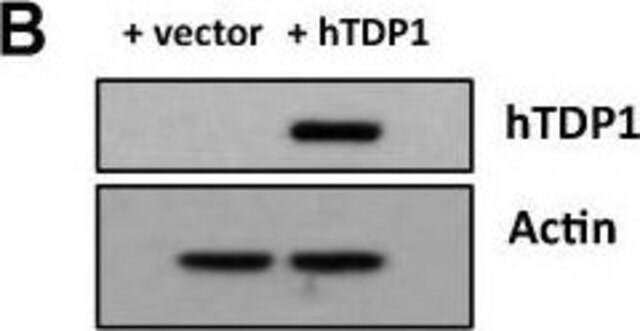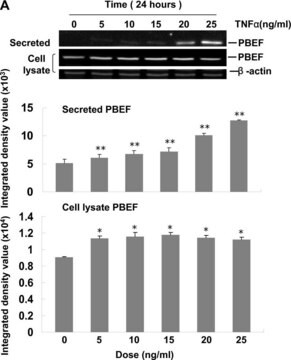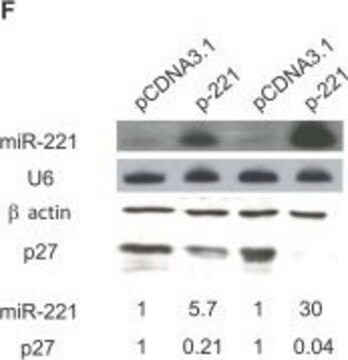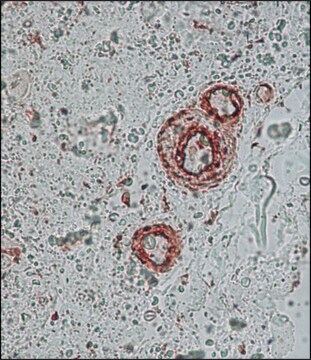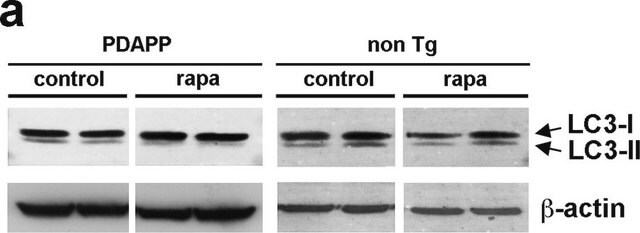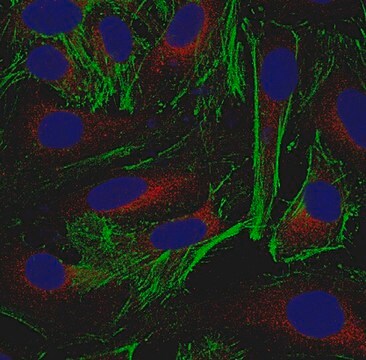MABT824
Anti-gamma-Actin/ACTG1 Antibody, clone 2A3
clone 2A3, from mouse
Synonyme(s) :
Actin, cytoplasmic 2, gamma-Actin
About This Item
Produits recommandés
Source biologique
mouse
Niveau de qualité
Forme d'anticorps
purified immunoglobulin
Type de produit anticorps
primary antibodies
Clone
2A3, monoclonal
Espèces réactives
mouse, rat, human, chicken
Réactivité de l'espèce (prédite par homologie)
mammals (based on 100% sequence homology)
Technique(s)
immunocytochemistry: suitable
western blot: suitable
Isotype
IgG2bκ
Numéro d'accès NCBI
Numéro d'accès UniProt
Conditions d'expédition
wet ice
Modification post-traductionnelle de la cible
unmodified
Informations sur le gène
human ... ACTG1(71)
Description générale
Spécificité
Immunogène
Application
Cell Structure
Cytoskeleton
Immunocytochemistry Analysis: 5.0 µg/mL from a representative lot detected gamma-Actin/ACTG1 in HUVECs, HeLa and A431 cells.
Western Blotting Analysis: A representative lot detected downregulated cytoplasmic gamma-actin levels in stimulated (by A23187, TRAP-6, TNF, LPS, or IFN-γ) human cerebral microvascular endothelial D3 cells (hCMEC/D3) and their microparticles (MPs) when compared with unstimulated hCMEC/D3 and their MPs (Latham, S.L., et al. (2013). FASEB J. 27(2):672-683).
Western Blotting Analysis: A representative lot detected siRNA-mediated downregulation of cytoplasmic gamma-actin in A549 human lung carcinoma cells (Miazza, V., et al. (2011). Virology. 410(1):7-16).
Western Blotting Analysis: A representative lot detected cytoplasmic gamma-actin, but not beta-actin separated by 2-D gel electrophoresis of purified chicken gizzard actins or total protein extracts from human subcutaneous fibroblasts (HSCFs), canine MDCK cells, and rat aorta tissue (Dugina, V., et al. (2009). J. Cell Sci. 122(Pt 16):2980-2988).
Western Blotting Analysis: A representative lot detected BSA conjugated with cytoplasmic gamma-actin N-terminal peptide, but not BSA conjugated with N-terminal peptides derived from the 5 other actin types (Dugina, V., et al. (2009). J. Cell Sci. 122(Pt 16):2980-2988).
Immunocytochemistry Analysis: A representative lot detected TNF-stimulated localization of γ-actin into thick, intensely staining stress fibers concentrated apically in a submembranous network in human cerebral microvascular endothelial D3 cells (hCMEC/D3) (Latham, S.L., et al. (2013). FASEB J. 27(2):672-683).
Immunocytochemistry Analysis: A representative lot detected similar γ-actin cytoskeleton structure in human cerebral microvascular endothelial D3 cells (hCMEC/D3) with or without Rho kinase inhibitor Y-27632 treatment (Latham, S.L., et al. (2013). FASEB J. 27(2):672-683).
Immunocytochemistry Analysis: A representative lot detected a drastic subcellular redistribution of gamma-actin following Sendai virus infection of polarized Madin-Darby canine kidney (MDCK) epithelial cells by fluorescent immunocytochemistry staining of paraformaldehyde-fixed, methanol-treated cells (Miazza, V., et al. (2011). Virology. 410(1):7-16).
Immunocytochemistry Analysis: A representative lot detected cytoplasmic gamma-actin subcellular localization distinct from that of beta-actin in both spreading and stationary cells by fluorescent immunocytochemistry, using paraformaldehyde-fixed, methanol-treated HSCF human subcutaneous fibroblasts, HaCaT human keratinocytes, WI38 human embryonic fibroblasts,and Madin-Darby canine kidney (MDCK) cells (Dugina, V., et al. (2009). J. Cell Sci. 122(Pt 16):2980-2988).
Qualité
Western Blotting Analysis: 0.5 µg/mL of this antibody detected gamma-Actin/ACTG1 in 10 µg of HeLa cell lysate.
Description de la cible
Forme physique
Stockage et stabilité
Autres remarques
Clause de non-responsabilité
Vous ne trouvez pas le bon produit ?
Essayez notre Outil de sélection de produits.
En option
Code de la classe de stockage
12 - Non Combustible Liquids
Classe de danger pour l'eau (WGK)
WGK 1
Point d'éclair (°F)
Not applicable
Point d'éclair (°C)
Not applicable
Certificats d'analyse (COA)
Recherchez un Certificats d'analyse (COA) en saisissant le numéro de lot du produit. Les numéros de lot figurent sur l'étiquette du produit après les mots "Lot" ou "Batch".
Déjà en possession de ce produit ?
Retrouvez la documentation relative aux produits que vous avez récemment achetés dans la Bibliothèque de documents.
Notre équipe de scientifiques dispose d'une expérience dans tous les secteurs de la recherche, notamment en sciences de la vie, science des matériaux, synthèse chimique, chromatographie, analyse et dans de nombreux autres domaines..
Contacter notre Service technique

